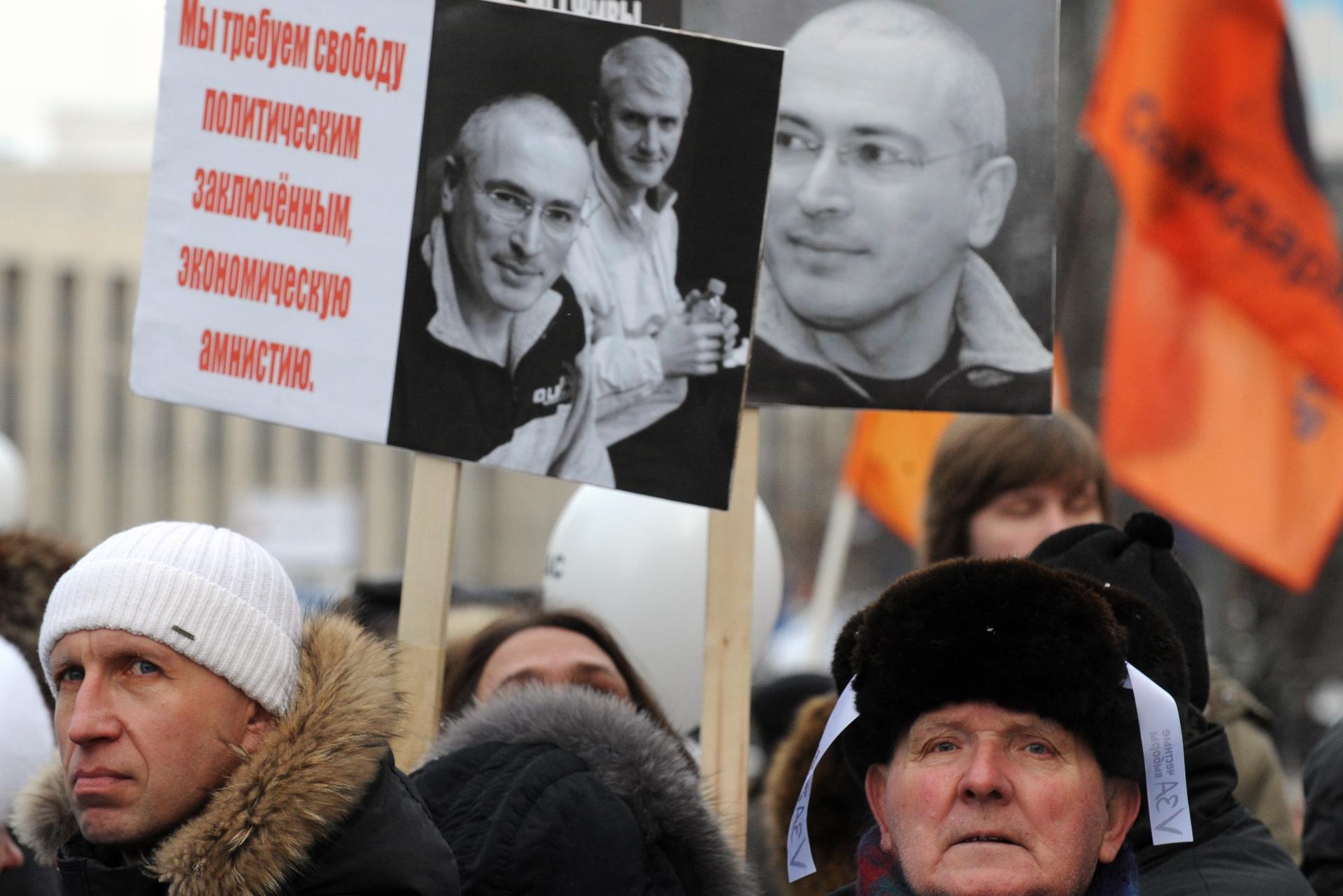Putin’s grip: Turn your head and Khodorkovsky
A potent symbol for anti-Kremlin protesters, Khodorkovsky remains irrelevant for most Russians.
Ten years can be a long time in Russia.
Since 2003, the country has arisen as a global energy power and foreign policy force to be reckoned with. At home, President Vladimir Putin has come to represent what his supporters say is its transformation from a fractured, suffering state into a heavily centralized bureaucratic machine.
One thing has remained constant, however — a kind of elephant in the Kremlin many say helped enable Putin’s ambitions: the case of Mikhail Khodorkovsky, the former oil tycoon who was once Russia’s richest man before he was imprisoned for tax evasion, embezzlement and theft.
As a small scattering of Russians, mainly among the liberal intelligentsia, quietly marks the tenth anniversary on Friday of Khodorkovsky’s October 2003 arrest — when commandos snatched him from his private jet — the prospect of two very different possible fates loom over him ahead of his scheduled release next year. One is a potential amnesty, the other the possibility of a third criminal case aimed at keeping him in prison for more years.
His arrest was a watershed for Putin-era Russia that coincided with the sweeping renationalization of key natural resource assets and what critics say has been a gradual clamping down on civic expression and political participation.
An outspoken Kremlin critic who funded various NGOs and opposition parties when the first-term president was still consolidating power, Khodorkovsky challenged his authority by lobbying to privatize the state oil pipeline monopoly, the government’s last remaining lever of control over the then-largely private oil industry.
A planned merger between his Yukos company and Sibneft, another oil firm, would have created one of the world’s largest energy corporations — a prospect many believe also didn’t sit well with the Kremlin.
He ignored numerous warnings that Putin’s patience was wearing thin. Arrested at gunpoint on a Siberian tarmac, he was sentenced in 2005 to nine years in prison.
Masha Lipman, a researcher at the Carnegie Moscow Center, says his case signaled a sea change in how Russia’s courts would be used for years to come.
“This was the first time that law enforcement was used in such an egregious way to pursue the interests of the Russian leadership,” she said.
But there’s speculation now that a recent proposal for a wide-ranging amnesty for prisoners, floated by the Kremlin’s human rights council, may pave the way for Khodorkovsky’s pardon.
Released last week, the plan — which would require approval from the State Duma as well as Putin — proposes releasing many first-time and nonviolent offenders, women with children and others.
The amnesty would possibly apply to jailed Pussy Riot rockers Nadezhda Tolokonnikova and Maria Alyokhina, both mothers of young children, who were sentenced in August 2012 for their raucous anti-Putin protest at Moscow’s main Russian Orthodox cathedral.
It would also potentially clear opposition leader and recent Moscow mayoral candidate Alexei Navalny, whose five-year sentence for fraud and embezzlement was suspended by an appeals court last week.
But Khodorkovsky supporters aren’t holding out much hope.
“I don’t think he’ll be included in the amnesty,” says Vladimir Pribylovsky of Moscow’s Panorama think-tank. “They may make a special exclusion just for him, or make it so that his charges don’t fall under the amnesty.”
Some believe the other option is more likely. Hints that the authorities are preparing another set of charges against Khodorkovsky have surfaced in recent months.
Most prominent was the flight to Paris earlier this year of Sergei Guriev, a renowned liberal economist who says pressure from state investigators forced him to flee Russia.
Guriev played a key role in preparing a 2011 report by various Russian and foreign experts, commissioned by then-President Dmitry Medvedev, which concluded that Khodorkovsky’s second trial — which ended with a conviction in December 2010 — was riddled with legal shortcomings.
Several other authors of the report have also been pressured by the authorities during the past year. Observers say investigators have been looking into the possibility that Khodorkovsky illicitly fed cash to Russian NGOs in order to influence the report’s conclusion.
However, speculation over a potential third case has died down considerably since the Guriev affair captured the attention of Moscow’s chattering classes last summer.
Political analyst Stanislav Belkovsky — a onetime Kremlin insider whose 2003 report about oligarchs’ misdoings is believed to have helped pave the way for Khodorkovsky’s arrest — says he sees “no real signs” of a new trial.
But he acknowledges what he describes as the unpredictability that pervades Russia’s political and legal landscape.
“The decision could never be made without Putin’s approval, or even without Putin’s initiative,” he said. “Let’s wait — maybe the third case will emerge from nowhere, unexpectedly.”
More from GlobalPost: Russia: Not in my backyard
Pribylovsky takes a dimmer view. He argues that Khodorkovsky is more dangerous today than he was ten years ago.
Although the vast majority of Russians care little about Khodorkovsky, he says the former oil tycoon’s image as a political martyr has reached nearly mythic proportions among the nascent opposition movement, which often raises Khodorkovsky as a symbol of widespread political oppression.
That’s why he believes a third option — Khodorkovsky’s simply finishing out his sentence next August — doesn’t exist.
“As long as Putin is around,” Pribylovsky says, “Khodorkovsky will be sitting in jail.”
Every day, reporters and producers at The World are hard at work bringing you human-centered news from across the globe. But we can’t do it without you. We need your support to ensure we can continue this work for another year.
Make a gift today, and you’ll help us unlock a matching gift of $67,000!
